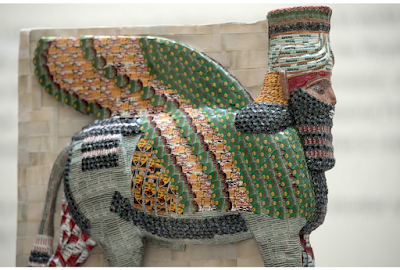
A winged Assyrian bull made of 10,000 cans of date syrup – popularly know to Iraqi Jews as silan – is now gracing the fourth plinth in London’s Trafalgar Square. It is a statement about the destruction of Iraq’s heritage by Michael Rakowitz, an artist-provocateur with Iraqi-Jewish roots. The Guardian has the story (with thanks: Michelle):
Rakowitz’s Assyrian winged bull is made of 10,000 date syrup cans
In February 2015, Isis militants videoed themselves drilling the face off one of the commanding stone statues that had guarded the gates of the ancient city of Nineveh for more than a thousand years. The lamassu – winged bulls with serene human faces – were among the most monumental casualties of a spree of destruction that over just a few days reduced many of Iraq’s most precious artefacts to pebbles.
On 28 March, 2018, the life-sized “ghost” of one of these fabulous Assyrian creatures will be unveiled atop the fourth plinth in London’s Trafalgar Square, where it will stand with its back to the National Gallery, gazing south-east past the Foreign Office and the Houses of Parliament towards its spiritual home in the Middle East.
The 14ft-long statue is both a one-off statement and part of an ambitious long-term project by Michael Rakowitz, a 44-year-old Iraqi-American who has become one of the world’s most political – and powerful – artist-provocateurs. The aim of The Invisible Enemy Should Not Exist is no less than to reconstruct all 7,000 objects known to have been looted from the National Museum of Iraq in the aftermath of the 2003 invasion by the US-led coalition. (…)
Though he has never set foot in Iraq, Rakowitz is saturated in the culture of a country where his mother’s family lived until 1946 when, fearing for their safety as Arab Jews in an increasingly divided region, his grandfather made the decision to move them to the US, continuing to run his import-export business from New York.
From there, a generation on, they watched in horror as – in his mother’s words – the country they had escaped to invaded the one from which they had escaped. The start of the Iraqi looting coincided with Rakowitz’s own development, in his late 20s, from an artist who worked mainly in public spaces to one who was part of the gallery system. “When you get involved with galleries you have to come to terms with the thought that you’ve made something that’s going to be sold; and at the same time all these artefacts were being put up for sale.”
He became addicted to eBay (“It’s like a search engine for me”), on one occasion buying 18 of Saddam Hussein’s dinner plates from a US veteran and a refugee whose father had been a high-ranking soldier in the Iraqi army. The plates were to feature in one of his more mischievous works, Spoils (2011), in which he persuaded a Manhattan restaurant to use them to serve an Iraqi dish of venison and date syrup.
The project was halted after two months when the restaurant received a cease-and-desist letter from the US Department of State. The plates were confiscated and returned to Iraq in a diplomatic deal that he says was brokered by Barack Obama. “He was meeting with Nouri al-Maliki, so it was a ceremonial handover – a photo op … these 18 plates, which were a symbol of Saddam, going back on the plane of the Iraqi prime minister.”
Rakowitz insists he is not interested in controversy or spectacle but concedes that his work asks difficult questions. “I think discomfort is important. I describe the work I’m involved in as a process where problem-solving is also troublemaking.”

Leave a Reply